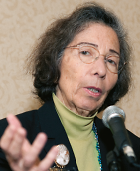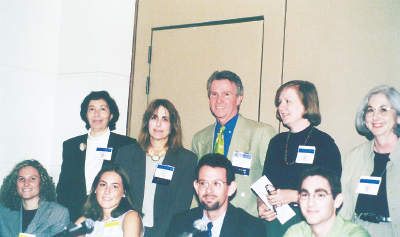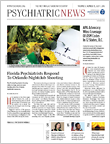“People are people, no matter how small,” as Theodor Seuss Geisel (aka “Dr. Seuss”) has told us. And the creator of some of the world’s most beloved children’s literature also reminded us that “adults are just outdated children.”
At APA’s 2016 Annual Meeting in Atlanta, some small children and some bigger, outdated ones whose parents happen to be psychiatrists gathered for a panel discussion and workshop titled “Children of Psychiatrists.” I had the good fortune of helping to organize the event for the 19th consecutive year since 1998, when Michelle Riba, M.D., first asked me to co-chair the workshop at the APA Annual Meeting in Toronto.
It’s a simple idea, one that comes naturally to us as psychiatrists—to ask our children to share their experiences and memories. As in past years, it was standing room only as we heard our children tell us some arresting, moving, and heartfelt things.
“One thing that is really annoying about having a mom who is a psychiatrist is that she always makes me talk about my feelings,” said 9-year-old Elias Brendel, son of Rebecca Brendel, M.D., J.D. “Sometimes I just want to be mad and not have to talk about it. That doesn’t work with my mom. She always says I will feel better if I talk about it, but how does she know what is best for me? I tell her it is my decision, and I even cry and scream at her. … When we finally talk about what I am upset about, I do feel better. ... It turns out she is right a lot. … There are good things about having a mom who listens to what you are thinking and feeling. … For example, when she listened about the specific video game system I wanted as a present, she got it, even though she hates video games.”
Elias’s brother had this to say: “She is the best mom in the world no matter what. I think she is really good at it because she learned so much as a psychiatrist.”
And then there was this from Grayson Graham, 9 years old and the son of Yvonne Graham, M.D.: “I think being the child of two great mothers, one a psychiatrist, is an enriching experience because you get to learn about all sides of the story. My psychiatrist mother, a really loving, caring parent, has a lot of experience handling a child. I agree with Elias that she makes you talk about your feelings a lot and gives every single detail, but that’s only so she can see what it’s like from your perspective and help you find the answer.
“I really love her; she is really thinking about everything she does, and she really takes time and consideration to think about the feelings that you have. She really understands you, and she really thinks about how loving you need to be, and about how every single thing goes into stuff. The experience is very teaching; it teaches you to balance between one side and another side, seeing problems and solutions. I think that most of all, if you are the child of a psychiatrist, always think of the stories that really end up being life-changing experiences. I really think it is a fun experience—having a psychiatrist as a mother—because I understand every side of the story and every loving and caring part of being a child.”
Some of those bigger, outdated children also shared their insights. My son, Steven Dickstein, M.D., a child and adolescent psychiatrist, said, “As a parent, you are always trying to figure out what is the right thing to do for your child. … My mom, Dr. Leah next to me, has apologized to me, saying she must have been a terrible parent at least a million times over the years. I think she is always nervous about ‘Am I doing the right thing?,’ and I think that makes her a good mother. Psychiatrists are people who think about how people work in terms of how feelings work and how do relationships work, and I think we bring that to our parenting. You are always trying to balance your role as a professional and a parent. On the one hand, my mom spent time on the phone helping patients when I was a child, and that taught me some things about how the world works, but she also always made time for me too. It’s all about balance.
“Because you can’t do everything,” Steven continued. “I think having a parent who is a psychiatrist helps teach you a language to talk about feelings and relationships. The thing I find about psychiatrists in general is they are empathic and interested in people. They care about people, and they care about understanding people. And I think that gets transmitted to their kids. I am really grateful my mom is a psychiatrist.”
Debra Pinals, M.D., also a psychiatrist, echoed Steven. “My experience with my mother was inspiring. She showed me the balance of work and family. She shifted into psychiatry from another branch of medicine in my adolescence, helping me see that anything is possible. She taught me the business end of running a practice, the importance of confidentiality since we were in a relatively small community, and the importance of lifelong learning and collegial connections.”
All of us who have participated in these annual workshops have benefitted from hearing from our children. “Seeing and hearing from children of psychiatrists was inspiring and reassuring,” Debra said. “We heard about parents who take time to listen, who role model positive work-family balance, and who enjoy their careers. It was an honor to be a participant on this panel and enjoyable to see the enthusiastic responses from the large audience.”
As we planned this article for Psychiatric News, Michelle commented, “The concept behind the workshop was that we wanted to be the best parents we could be—no matter our occupation—and that there may be issues with a specific occupation that may directly or indirectly impact on our children’s lives and development. Leah and I were very interested in this topic. When the workshop was begun, our children were younger, and we wondered if our colleagues were concerned about similar issues. Leah’s son Steven and my daughter Alissa participated in the first panel in Toronto. Since then our other children have also participated (been dragged, as they would probably say) into this workshop. We have learned a lot, and we hope others have as well.”
We have sincerely appreciated the support and thoughtfulness of the APA Scientific Program Committee over the years in helping us put on this workshop each year and at a time most convenient for the children and their parents. We already have received volunteers for next year’s 20th workshop. Will you consider joining us? ■


